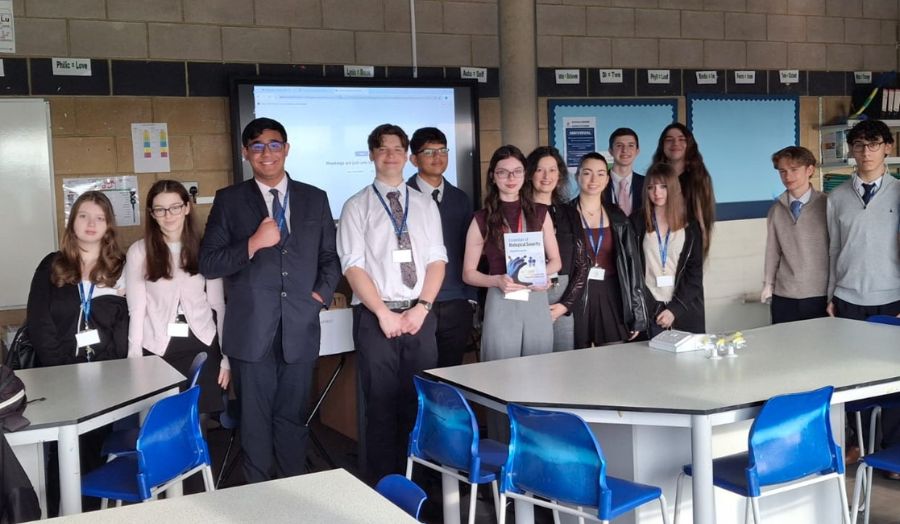While no one may know what caused the Covid outbreak, Professor Lijun Shang of London Met believes the pandemic should be a defining wake-up call for the world.
Date: 18 June 2025
While no-one may know what caused the Covid outbreak, Professor Lijun Shang of London Met believes the pandemic should be a defining wake-up call for the world.
What more visceral example do we need about how biohazards can spread uncontrollably, wreaking global havoc? Such hazards can be anything from a mutating virus to which we have no immunity, to crops which have been manipulated to become poisonous, to nerve agents like Novichok, as used by the Russian state in Salisbury in 2018.
“We know the impacts of the Covid pandemic were profound in almost every area of human existence – health-wise, psychologically, socially, economically. And yet, since 2019, the stakes have been raised considerably by a new development in science and technology”, says Shang, a professor of biomedical science in London Met’s School of Human Sciences.
That new development is Artificial Intelligence. Just as AI can be used for aiding ‘drug discovery’ – the process of refining medication until it becomes most effective against pathogens – it can also be used for the reverse: the creation of biohazards. As demonstrated by every sci-fi villain in literature and film, scientific advances can be used for good but also for harm. And, without proper governance, the advent of AI has opened up the potential for harm more dramatically than ever before.
“AI is one of the hot topics in biosecurity at the moment” says Professor Shang. “When the technology is developing this fast, and when gene-editing has become so easy, how can we continue to keep the world safe from nefarious actors who want to use biological advances to cause harm?”
There are various ways to maintain global stability in this context, explains Professor Shang. Among these, international collaboration and education are important.
This is why Shang’s centre at London Met, the Biological Security Research Centre, is building the International Biological Security Education Network (IBSEN). It hopes to be similar in scope to the International Nuclear Security Education Network (INSEN) which is organised through the International Atomic Energy Agency (IAEA), and its work will be akin to the work of the Advisory Board on Education and Outreach of the Chemical Weapons Convention. IBSEN does not yet receive UN funding.
The work of IBSEN will address: firstly, policy makers to set up proper national and international biosecurity strategies; secondly, scientists and professionals, for building an appreciation of concerns about the ‘dual use’ of research; and thirdly, the general public, to improve their understanding of biosecurity risks.
Since 2020, the centre has been developing new methodologies and creating new initiatives to boost biosecurity education nationally and internationally to address the challenges and drive impact.
For example, Oliva Ibbotson, a PhD candidate in the Biological Security Research Centre, has recently been leading a piece of work to pilot education in secondary schools for STEM students.
It’s a complex and challenging subject matter. Olivia explains how she attracts interest from the young people:
“I pique students’ interest in advance, by promoting the workshops with a degree of mystery to try to build their curiosity about what they might be about. I’m aware that students aged 16-18 years are likely to be under a lot of stress with exams, and so I keep the workshops casual and low pressure, with quizzes, games and ultimately, in the third and final workshop, a simulation exercise. The scenario is that there is a biosecurity outbreak at the school, and the students have different roles, and it is up to them to decided how to respond to the developing situation.
“I also use pop-culture references, like movies, TV series, video games and even music, to help them relate to the ideas and issues.
“So, I make it fun, but ultimately my aim is for the students to use the insights they learn, and the interest they’re building, in the future. What I’d love is to see biosecurity included in secondary school curriculum, and at foundation degree-level education, so that the next generation of professionals are armed with a real understanding about the threats we face.”
In a world where conspiracy theories are rife, and where misinformation is itself a weapon of rogue states, perhaps education for the next generation is the greatest tool in our kit to combat biosecurity risks.

Pic: The secondary school students who took part in the first biosecurity workshop.
